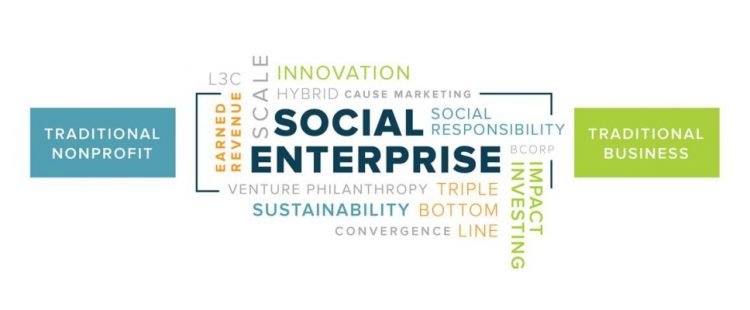How Does My Sector Contribute to Social Impact?

Social impact is one of those phrases that seem to constantly crop up in headlines, yet are hard to define precisely. Perhaps this is partly due to the fact that the phrase extends beyond just the nonprofit sector. To elaborate, Classy account manager Sophie Cheetham shares her holistic definition of social impact:
“Social impact spans not only the nonprofit industry but also the corporate arena. Nonprofits need to showcase the impact that they are making, what their role is in providing solutions to particular issues, or what they are doing to create sustainable, measurable solutions.
Corporations want to and need to be part of the social impact narrative too, whether that’s through CSR programs, supporting local or national nonprofits financially, or through grants. Consumers are increasingly looking for corporations that are socially minded. Corporations must also showcase the impact that they are making on a community and how they are affecting social change.”
In order to understand what social impact means you have to acknowledge the rapid evolution of nonprofit and for-profit business models. Those once black and white distinctions are intersecting more often than not since consumers are increasingly demanding that businesses behave in a socially responsible manner.
In fact, 87 percent of Americans reported they would purchase a product because a company supported an issue they cared about. This has led to an influx of social enterprises as well as for-profit businesses with a focus on corporate social responsibility (CSR).
With such a wide range of perspectives in the social impact sphere, different iterations of the phrase are inevitable. Let’s dissect what social impact means to a nonprofit organization, a social enterprise, and a business with a CSR focus.
Read Next: 7 Nonprofit Management Tips to Develop Your Career
If you asked a room full of nonprofit professionals what social impact meant, your audience would likely start to chatter among themselves, ask follow-up questions, and excitedly ponder how to sum up their organization’s impact.
The phrase takes on the most literal meaning for nonprofits, as it’s most often used to refer to the impact an organization has on its cause.
However, impact can be calculated in a number of ways, depending on the organization (i.e. funds raised, beneficiaries affected, programs activated) but it also goes beyond those tangible outputs. It also includes the long-term outcomes that aren’t immediately visible.
For example, Days for Girls can determine their quantitative impact on a given community by the number of feminine hygiene kits they provide, a specific output. But the outcomes may not manifest until a decade later when the girls who received the kits and attended school during their menstruation cycles have grown up, completed their education, helped provide for their family, and so on.
Read Now: How to Tie Fundraising Dollars to Impact
So even in the realm of nonprofits, the seemingly clear definition of social impact has a bit more to unpack.
Beyond nonprofits, social enterprises are another type of organization with a different business model that looks at social impact. According to the Social Enterprise Alliance (SEA), social enterprises are “organizations that address a basic unmet need or solve a social problem through a market-driven approach.”
An important facet of a social enterprise is that they focus on a “triple bottom line,” meaning they are not simply seeking profits, but also effecting social impact and focusing on environmental sustainability. So while they aren’t a true nonprofit, social enterprises are similarly dedicated to social good.
This graphic by SEA helps visualize the relationship between nonprofits, for-profits, and social enterprises.

To gain a better understanding of how social enterprises look at social impact, we asked Mikaela Clark, the Communications Coordinator at SEA to explain how she defines it:
To SEA, social impact is hopeful opportunity—the opportunity to level playing fields that have long been uneven, to create inclusive economies, to catalyze change movements in systems that aren’t serving our society and so much more. Social impact makes pathways where there are obstacles.
While this statement takes on a more connotative approach to defining social impact, the viewpoint rings true to what any social enterprise would hope to achieve: creating opportunities to affect systemic change that will have a positive and lasting impact on society.
Corporate social responsibility is a business approach that encourages companies to be cognizant of their impact on society through a commitment to sustainable development and investment in social and global challenges. While CSR programs are by no means a new initiative, the frequency and level of investment in social responsibility programs have increased from “nice to have” to practically necessary as consumers increasingly want to align themselves with brands that give back.
This doesn’t mean that corporations only implement CSR or social good programs because they want to stay competitive in the marketplace. Many for-profit giants (think Microsoft and Google) are wholly invested in their social impact initiatives because their leadership believes in making a change.
In fact, Fortune releases an annual Change the World list of companiesthat “do well by doing good.” Each company has a minimum annual revenue of $1 billion and isn’t just writing a check, but rather baking social good into the DNA of their business strategy. Which, when you think about the zeroes in those bank accounts and the impact these companies have on the global economy it’s encouraging to see that this is an upward trend for many businesses.
When a for-profit with a strong CSR focus references social impact, they do so in the same nature as a social enterprise, but often to a lesser degree. A social enterprise, by definition, has a strong foothold in affecting social good, whereas CSR can vary from sponsoring a nonprofit’s annual fundraising event, to revolutionizing the way you develop a product. Oftentimes, this measure is dependent on the economic stability of a company and whether or not it is financially feasible.
Below are a few ways a corporate sponsor can be involved in your organization’s efforts:
- Act as an employee giving program partner
- Drive donations with matching campaign
- Make large financial gifts
- In-kind sponsorship (donation of time, services, expertise, or goods)
Download the Guide to Pitching Corporate Sponsors
Overview
There are many thoughts on the evolving relationship between the nonprofit, for-profit, and social enterprise industries, but according to Forbes, the future will likely continue on the path of insurgence toward the for-profit social enterprise model. Companies are quickly realizing that by helping to advance solutions to the societal issues that nonprofits tackle, their businesses will benefit in the long run.
As a social enterprise, Classy is an example of how many modern companies approach the impact conversation. In addition to being actively engaged with local nonprofits, Classy is committed to Pledge 1%, an organization that encourages corporations to ingrain social impact into their business model by giving one percent of their time, product, equity, or profit to nonprofit organizations.
While the context may differ for each industry, the core characteristic of social impact remains the same: effecting lasting positive change. If you want to learn how you can help further social impact, you can watch all the recordings from the live sessions at the Collaborative: Virtual Sessions, as well as over 20 bonus Extended Sessions, for free below.

Access the Collaborative Extended Sessions



